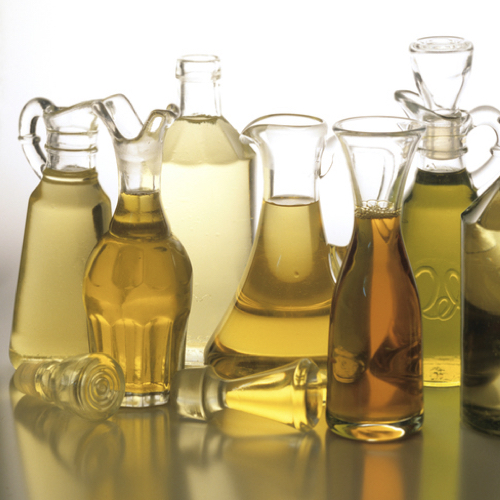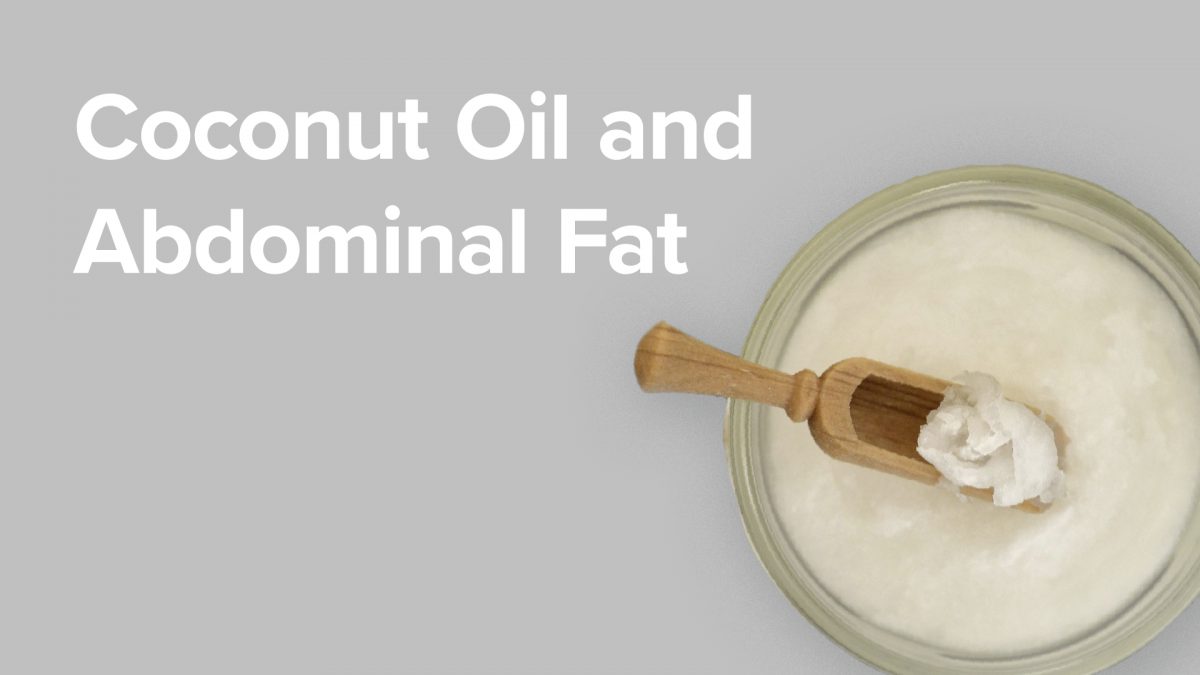
Oils
The largest diet and health study, co-sponsored by the National Institutes of Health and the American Association of Retired Persons, followed about 545,000 people aged 50 to 71 over the course of a decade and was the first to separate out the role of fats from plant sources, such as those found in nuts, seeds, avocados, and olive and vegetable oils, versus all animal sources, including meats, dairy products, and eggs. The consumption of animal-sourced fat was significantly associated with pancreatic cancer risk, but no correlation was found with the consumption of plant fats.
Does that mean plant-based oils are appropriate for a healthy diet and we need only avoid animal-based fats?
We’ve known for nearly two decades that a single fast-food meal, such as a Sausage and Egg McMuffin, can stiffen our arteries within hours, cutting in half their ability to relax normally. And, just as this inflammatory state starts to calm down five or six hours later, we may once again assault our arteries with another load of harmful food, leaving many stuck in a danger zone of chronic, low-grade inflammation. Indeed, unhealthy meals don’t just cause internal damage decades down the road, but within hours of consumption—and the relative paralysis of our arteries for hours after eating fast food may also occur after consuming olive oil.
It’s not only olive oil, however. Other oils have also been shown to have deleterious results on endothelial function: a significant and constant decrease in endothelial function three hours after each meal, independent of the type of oil or whether the oil was fresh or deep fried. Olive oil might be better than omega-6-rich oils or saturated fats, but may still show adverse effects.
I think of oil as the table sugar of the fat kingdom. Similar to how manufacturers take healthy foods like beets and throw out all their nutrition to make sugar, they take wholesome corn and scorch-earth it down to corn oil. Like sugar, corn oil calories may be worse than just empty.
As even extra-virgin olive oil may impair our arteries’ ability to relax and dilate normally, its use should be curtailed. Cooking without oil is surprisingly easy. To keep foods from sticking, sauté in wine, sherry, broth, vinegar, or just plain water. For baking, I’ve successfully used mashed bananas or avocado, soaked prunes, and even canned pumpkin to substitute for oil to provide a similar moistness.
For substantiation of any statements of fact from the peer-reviewed medical literature, please see the associated videos below.
Image Credit: cerealphotos / Thinkstock. This image has been modified.
Popular Videos for Oils

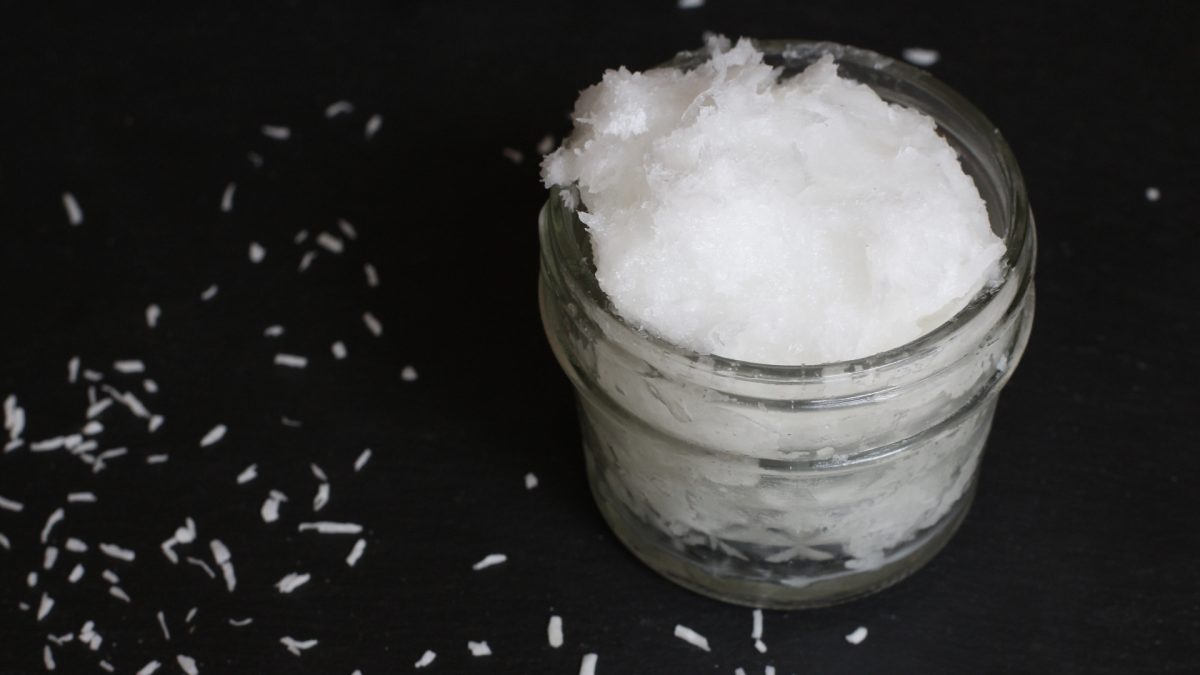
Coconut Oil and the Boost in HDL “Good” Cholesterol
The effects of coconut oil are compared to butter and tallow. Even if virgin coconut...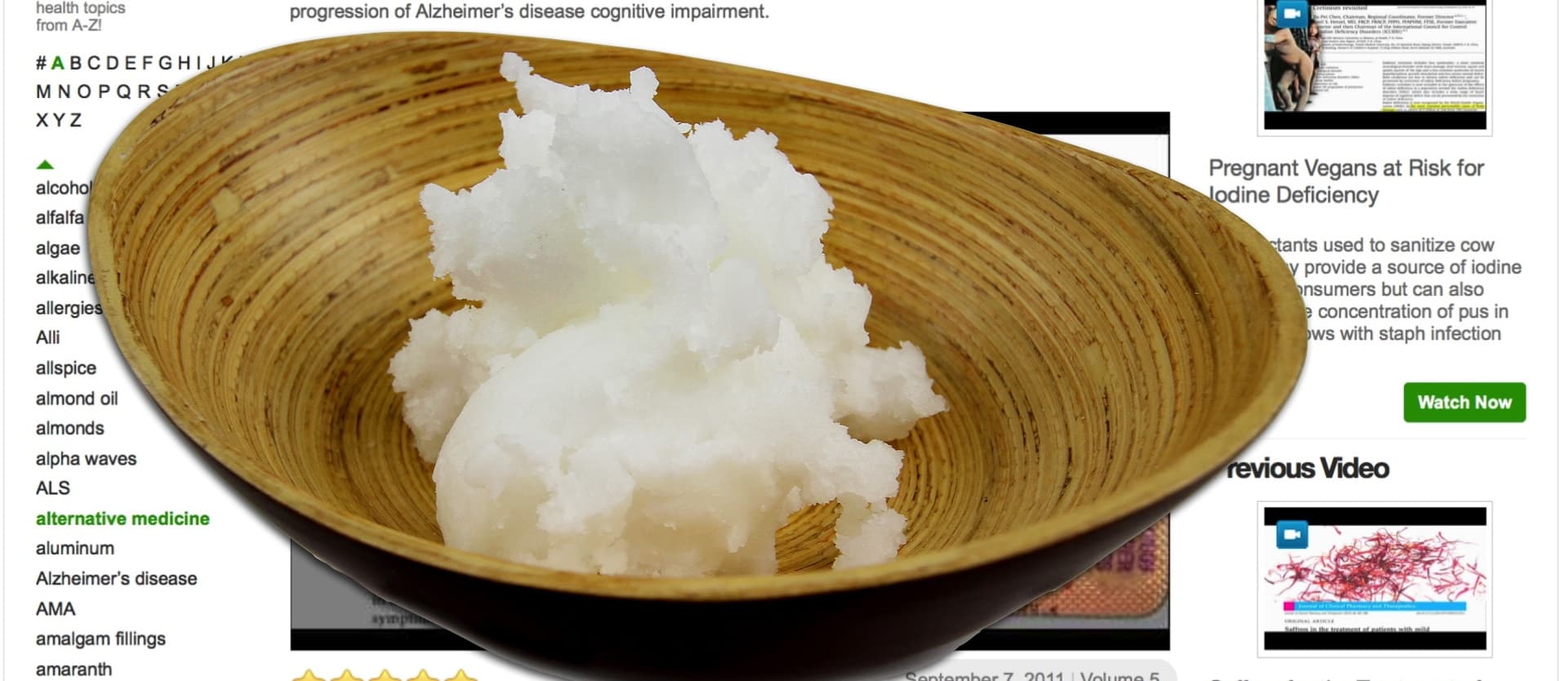
Does Coconut Oil Clog Arteries?
Sellers of coconut oil use a beef industry tactic to downplay the risks associated with...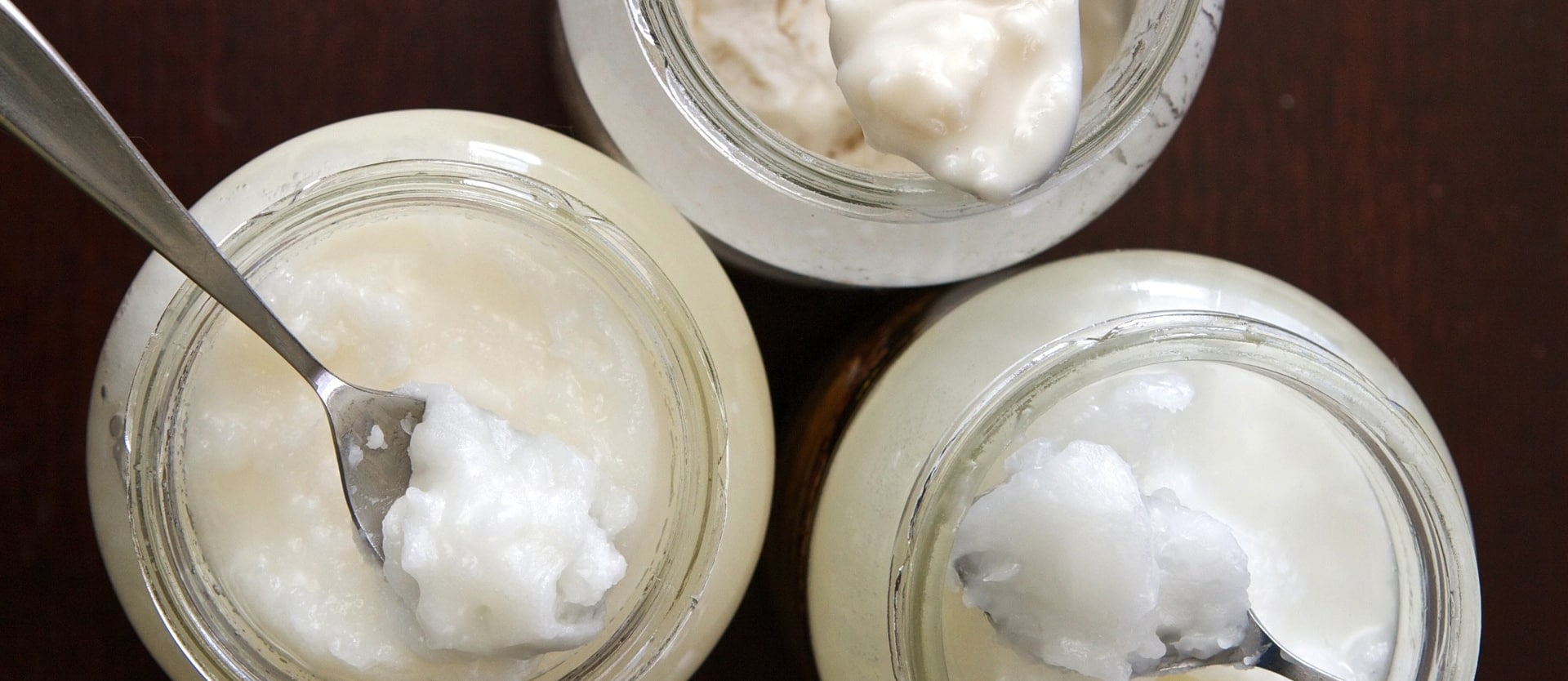
Does Coconut Oil Cure Alzheimer’s?
Though there have been more than a thousand papers published on coconut oil in medical...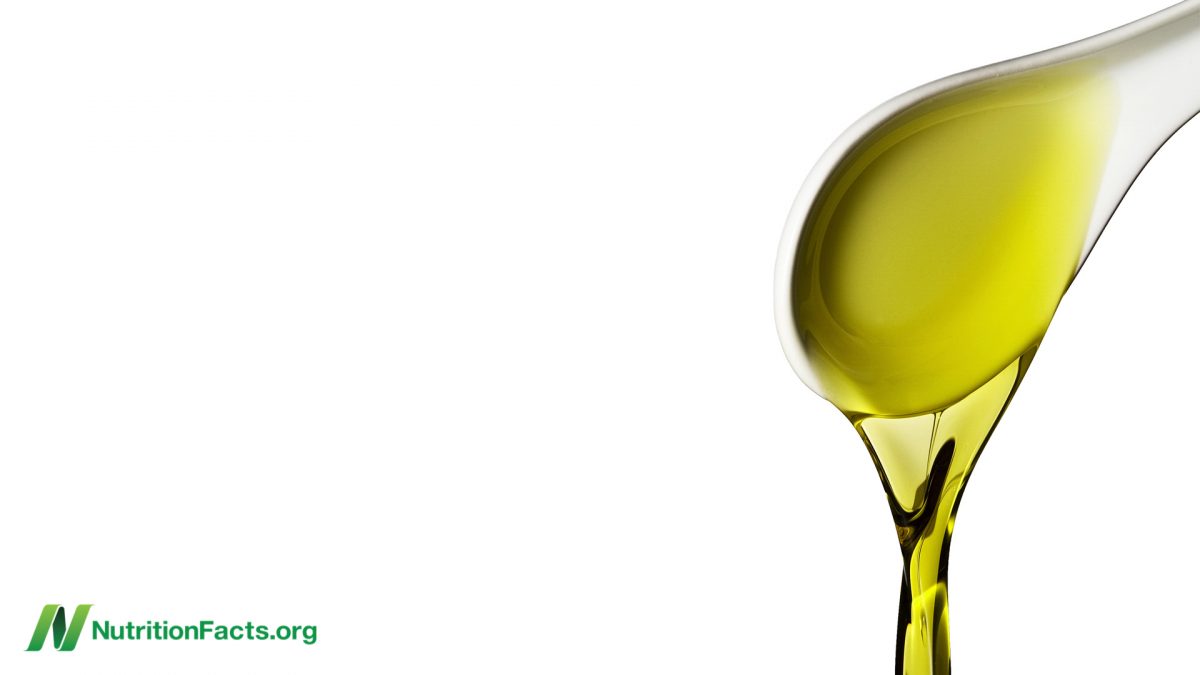
Does Oil Pulling Help with Cancer?
What evidence exists to suggest oil pulling can effectively treat serious diseases, such as paralysis,...All Videos for Oils
-

Answering Your Questions About Cholesterol and Diabetes
I answer some common questions I’ve been asked about cholesterol and diabetes, such as “What is the ideal LDL?” “What’s going on when someone eats healthfully but their glucose is still out of control?”
-

Saturated Fat Causes Artery and Lung Inflammation
What happens within hours of eating a high-fat meal?
-

Do the Health Benefits of Peanut Butter Include Longevity?
Why are nuts associated with decreased mortality, but not peanut butter?
-

The Carcinogen Glycidol in Cooking Oils
Glycidol may help explain why people who eat fried foods get more cancer.
-

Foods That Cause Inflammation
Inflammatory markers can double within six hours of eating a pro-inflammatory meal. Which foods are the worst?
-

Plant-Based Eating Score Put to the Test
How can you get a perfect diet score?
-

Extra Virgin Olive Oil for Arthritis
What happened when topical olive oil was pitted against an ibuprofen-type drug for osteoarthritis and rheumatoid arthritis?
-

3-MCPD in Refined Cooking Oils
There is another reason to avoid palm oil and question the authenticity of extra-virgin olive oil.
-

The Side Effects of 3-MCPD in Bragg’s Liquid Aminos
Chlorohydrin contaminates hydrolyzed vegetable protein products and refined oils.
-

The Health Benefits of Sorghum
Learn why sorghum is one of my favorite new grains.
-

Win-Win Dietary Solutions to the Climate Crisis
The EAT-Lancet Commission lays out the best diet for human and planetary health.
-

Stainless Steel or Cast Iron: Which Cookware Is Best? Is Teflon Safe?
What’s the best type of pots and pans to use?
-

How to Lower Lp(a) with Diet
What to eat and what to avoid to lower the cardiovascular disease risk factor lipoprotein(a).
-

The Role of Taxpayer Subsidies in the Obesity Epidemic
Why are U.S. taxpayers giving billions to support the likes of the sugar and livestock industries?
-

Cut the Calorie-Rich-And-Processed Foods
We have an uncanny ability to pick out the subtle distinctions in calorie density of foods, but only within the natural range.
-

Foods That Help Headache and Migraine Relief
Plant-based diets are put to the test for treating migraine headaches.
-

Fasting to Naturally Reverse High Blood Pressure
A whole food plant-based diet can be used to help lock in the benefits of fasting to kickstart the reversal of high blood pressure.
-

Is Cheese Healthy? Compared to What?
Dairy is compared to other foods for cardiovascular (heart attack and stroke) risk.
-

The Best Diet for Upset Stomach
What to avoid and what to eat to help with dyspepsia.
-

Do Chia Seeds Help with Belly Fat?
The secret to unlocking the benefits of chia seeds may be grinding them up.
-

The Effects of Avocados on Inflammation
High-fat plant foods—avocados, peanuts, and walnuts—and olive oil are put to the test.
-

Does Cocoa Powder Cause Acne?
Is the link between chocolate and acne due to the sugar, the milk, or the cocoa in chocolate? Researchers put white chocolate, dark chocolate, baking chocolate, and cocoa powder to the test to find out.
-

Does Chocolate Cause Acne?
What are the effects of dairy products, sugar, and chocolate on the formation of pimples?
-

Are Avocados Fattening?
Studies funded by the Avocado Board suggest avocados may facilitate weight loss, but compared to what?
-

Treating Advanced Prostate Cancer with Diet: Part 2
What happens when metastatic prostate cancer patients were taught to increase intake of whole grains, vegetables, fruits, and beans, and to decrease consumption of meat, dairy, and junk?
-

What About Coconuts, Coconut Milk, and Coconut Oil MCTs?
Do the medium-chain triglycerides in coconut oil and the fiber in flaked coconut counteract the negative effects on cholesterol and artery function?
-

Coconut Oil and the Boost in HDL “Good” Cholesterol
The effects of coconut oil are compared to butter and tallow. Even if virgin coconut oil and other saturated fats raise LDL “bad” cholesterol, isn’t that countered by the increase in HDL “good” cholesterol?
-

Banning Trans Fat in Processed Foods but Not Animal Fat
After the trans fat oil ban, the only remaining major sources of trans fat will be from meat and dairy.
-

Which Are Better: Chia Seeds or Flaxseeds?
What effect do chia seeds have on weight loss, blood sugar, cholesterol, blood pressure, and inflammation?
-

Should We All Take Aspirin to Prevent Heart Disease?
The benefits of taking a daily aspirin must be weighed against the risk of internal bleeding.
-

How Not to Die from Cancer
What happens when we put cancer on a plant-based diet?
-

Should Vegans Take DHA to Preserve Brain Function?
Learn why I recommend 250mg a day of a pollutant-free source of long-chain omega-3 fatty acids.
-

Should We Take DHA Supplements to Boost Brain Function?
Overt omega-3 deficiency is rare, but do short-term experiments on cognitive function suggest there might be an optimal DHA dose?
-

Paleo Diet Studies Show Benefits
What happens when Paleolithic-type diets are put to the test?
-

Animal Protein Compared to Cigarette Smoking
Only about 1 in 10,000 people live to be 100 years old. What’s their secret?
-

Vinegar and Artery Function
Sprinkling vinegar on greens may augment their ability to improve endothelial function.
-

Curing Painful Diabetic Neuropathy
Diabetics suffering from nerve pain for years are cured within days with a plant-based diet.
-

Almonds for Osteoporosis
What happens when you take blood from people before and then again four hours after almond consumption, and drip that blood on bone cells?
-

Diabetes Reversal: Is It the Calories or the Food?
Even when study subjects were required to eat so much that they didn’t lose any weight, a plant-based diet could still reverse type 2 diabetes in a matter of weeks.
-

Reversing Diabetes with Food
Type 2 diabetes can be reversed with severe calorie restriction—whether by surgery or starvation—but did you know it can also be reversed simply by eating healthier?
